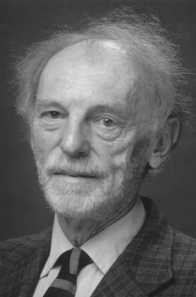John V. Wehausen
| John Vrooman Wehausen | |
|---|---|
 | |
| Born |
23 September 1913 Duluth, Minnesota |
| Died | 6 October 2005 (aged 92) |
| Fields | Marine hydrodynamics |
| Institutions | University of California, Berkeley |
| Alma mater | University of Michigan |
| Doctoral advisor | T. H. Hildebrandt |
| Doctoral students |
T. Francis Ogilvie[1] Ronald W. Yeung[2] Sander M. Calisal[3] |
| Notable awards |
Georg Weinblum Lectureship (1978–1979) Society of Naval Architects and Marine Engineers, Davidson Medal (1984)[4] American Society of Mechanical Engineers, International Lifetime Achievement Award |
John Vrooman Wehausen (1913 – 2005) was an American applied mathematician considered to be one of the world's leading researchers and pioneers in the field of marine hydrodynamics.[5][6]
His contributions were in the area of ship waves, ship maneuverability, floating systems in waves, and ship-generated solitary waves.[7] In 1960, he and Edmund V. Laitone published the comprehensive review article Surface Waves, which to this day is still an important resource for understanding the dynamics of water waves. Wehausen was emeritus professor of engineering science at the University of California, Berkeley.
Education and career
Wehausen matriculated at the University of Michigan where he earned B.S. (1934) and Ph.D. degrees in mathematics (1938) as well as an M.S. in physics (1935). In 1937, Wehausen began his first teaching position as an instructor in mathematics at Brown University. After Brown, Wehausen spent teaching stints at Columbia University and the University of Missouri before working for the U.S. Navy during World War II in operations research. He joined the David Taylor Model Basin as a mathematician, and during his three-year tenure there, he met Georg P. Weinblum, the German ship hydrodynamicist. His interest in water-wave theory and ship hydrodynamics can be traced to that period.
In 1956, Professor Wehausen accepted a position at the University of California, Berkeley, where he taught until 1984 and where he remained an active researcher thereafter. At Berkeley, Wehausen helped establish the Department of Naval Architecture in 1958 with support from the Office of Naval Research. At the time, only three other U.S. institutions—Massachusetts Institute of Technology, the University of Michigan and the Webb Institute—offered accredited degree programs in naval architecture.[5]
In 2002, a Special Symposium during the Offshore Mechanics and Arctic Engineering Conference in Oslo, Norway was organized as a tribute to Wehausen.[8]
In 2006, a John V. Wehausen Memorial Endowment was established at the UC Berkeley Foundation to provide a scholarship for graduate study in Wehausen's areas of professional interest.[7]
Personal
Wehausen loved languages, music, and literature. He was proficient in a number of languages and also was an accomplished musician.[6][7]
Selected publications
- Wehausen, J. V. & Laitone, E. V. (1960), "Surface Waves", in Flügge, S. & Truesdell, C., Encyclopaedia of Physics (Springer Verlag) 9: 446–778
- Wehausen, J. V. (1971), "The Motion of Floating Bodies", Annual Review of Fluid Mechanics 3: 237–268, Bibcode:1971AnRFM...3..237W, doi:10.1146/annurev.fl.03.010171.001321
- Wehausen, J. V. (1973), "The wave resistance of ships", Advances in Applied Mechanics 13: 93–245
References
- ↑ "OMAE 2010 Conference Highlights". Retrieved 2011-01-14.
- ↑ "25th Georg Weinblum Lecture". sname.org. Retrieved 2011-01-15.
- ↑ http://mech.ubc.ca/alisal/
- ↑ "Davidson Medal". Retrieved 2011-01-15.
- ↑ 5.0 5.1 "John V. Wehausen, leader in marine hydrodynamics, dies at 92". berkeley.edu. Retrieved 2011-01-14.
- ↑ 6.0 6.1 "In Memory of Dr. John V. Wehausen". berkeley.edu. Retrieved 2011-01-14.
- ↑ 7.0 7.1 7.2 "In Memoriam: John V. Wehausen". universityofcalifornia.edu. Retrieved 2011-01-14.
- ↑ "The New Ocean Engineering Symposium and the John V. Wehausen "Mini Symposium" on Water Waves". ooae.org. Retrieved 2011-01-15.
External links
- Surface Waves (Online Edition)
- John V. Wehausen Memorial Graduate Scholarship
- John V. Wehausen at the Mathematics Genealogy Project